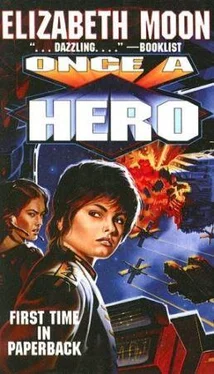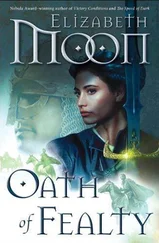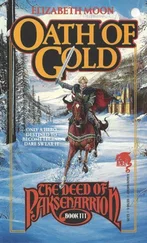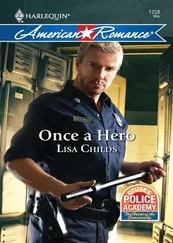Elizabeth Moon - Once a Hero
Здесь есть возможность читать онлайн «Elizabeth Moon - Once a Hero» весь текст электронной книги совершенно бесплатно (целиком полную версию без сокращений). В некоторых случаях можно слушать аудио, скачать через торрент в формате fb2 и присутствует краткое содержание. Жанр: Космическая фантастика, Боевая фантастика, на английском языке. Описание произведения, (предисловие) а так же отзывы посетителей доступны на портале библиотеки ЛибКат.
- Название:Once a Hero
- Автор:
- Жанр:
- Год:неизвестен
- ISBN:нет данных
- Рейтинг книги:3 / 5. Голосов: 1
-
Избранное:Добавить в избранное
- Отзывы:
-
Ваша оценка:
- 60
- 1
- 2
- 3
- 4
- 5
Once a Hero: краткое содержание, описание и аннотация
Предлагаем к чтению аннотацию, описание, краткое содержание или предисловие (зависит от того, что написал сам автор книги «Once a Hero»). Если вы не нашли необходимую информацию о книге — напишите в комментариях, мы постараемся отыскать её.
Once a Hero — читать онлайн бесплатно полную книгу (весь текст) целиком
Ниже представлен текст книги, разбитый по страницам. Система сохранения места последней прочитанной страницы, позволяет с удобством читать онлайн бесплатно книгу «Once a Hero», без необходимости каждый раз заново искать на чём Вы остановились. Поставьте закладку, и сможете в любой момент перейти на страницу, на которой закончили чтение.
Интервал:
Закладка:
She looked over at the horse. It was grazing steadily, not so much as an earflick to indicate any danger. She leaned her head back on her arm again. She could feel the warmth of the sun where it touched her, and the coolness of the shadows. She felt herself relaxing, as she had not relaxed since she arrived—or for how long before?—and let her eyelids sag shut. She rolled her face into the fragrant grass to get the annoying sun off her eyelids . . .
And woke with a jerk and a cry as a shadow stooped over her. Even as she lunged up, she recognized the horse. It snorted and plunged away, fighting the hobbles, frightened because she was.
It had only wanted a treat, she told herself. Her heart was racing; she felt sick to her stomach. The horse had settled uneasily a short distance away, watching her with pricked ears.
“You scared me,” Esmay said to the horse. It blew a long rattling sigh at her, meaning Me, too. “It was your shadow,” Esmay said. “Sorry.” She looked around. She had slept at least an hour, more likely two, and she could feel the heat of sunburn on her ear. She had worn a hat . . . but not when she lay down. Idiot.
When her heart slowed, she felt better, rested. Lunch, her stomach reminded her. She walked back to the rock, shaking the kinks out of legs and arms, and then took her hat and the lunch sack back into the sun. Now she was ready for that meat pasty, and the horse would enjoy the apple.
After lunch, she walked down by the stream, and let her mind loose again. She had come home, and found the truth, and it had not killed her. She didn’t like it—it hurt, and she knew it would continue to hurt—but she had survived the first terrifying hours as she had survived the initial assault in childhood. She felt shaky, but not in danger of dissolution.
Was she ready to give this up, this lovely valley that had helped her cling to sanity so often? The stream chuckled and splashed at her feet; she knelt and put her hand into its icy flow. She loved this sound, the smell of the pungent herbs on its bank, the feel of icy water on her hands and face when she knelt to drink. She loved the heavy tonk of stone on stone when she stood on the uneven one that rocked back and forth.
She did not have to decide now. She had years . . . if she stayed in Fleet, if she qualified for rejuvenation, she had many, many years. Long after her father died, long after everyone who had betrayed her died, she could come home to this valley, still young enough to enjoy it. She could build her cabin and live here in peace. It would not have to hurt to return; she could avoid that pain just by persisting.
Against this vision rose the vivid, eager face of her cousin Luci, Luci willing to risk struggle, conflict, pain . . . the opposite of prudence. But Luci had not suffered what she had suffered. Tears burned in her eyes again. If she gained her peaceful valley at the end by simply outlasting those who had betrayed her . . . Luci would be old, perhaps dead . . . because how many normal lifetimes would she live, before she had earned retirement and the peace of her valley?
She would like to have Luci for a friend as well as a business partner, Luci who now looked up to her, as she could not recall anyone in the family looking up to her before.
“It’s not fair,” she said to the trees and the slopes and the gurgling water. An icy breeze slid down the creek bed and chilled her. Stupid complaint; life was not about fairness. “He lied to me!” she screamed suddenly. The horse threw up its head, ears pointed at her; somewhere upstream jays squalled and battered their way through thickset twigs.
Then it was quiet again. The horse still watched her with the suspicion of the edible for the eater, but the jays had flown away, their scolding voices diminishing. The water gurgled as before; the breeze failed and came again like the breath of some vast being larger than mountains. Esmay felt her rage draining away with it, not really gone but its immediate pressure eased.
She spent another hour wandering around the glade, drifting in and out of moods like the clouds drifting in and out of sight above the slopes. Sweet memories of her childhood trips—of learning to climb on the boulders at the foot of the cliff, of the time she found a rare fire-tailed salamander under the ledge of the creek’s largest pool—swept over and under the other memories, the bad ones. She thought about climbing the cliff again, but she had not brought any climbing gear, and her legs were already stiff and sore from riding.
Finally, as the afternoon shadows began to climb the boulders, she caught and saddled the horse again. She found herself wondering if her father had told Papa Stefan . . . or only Great-grandmother. She wanted to be furious with Great-grandmother for not overruling her father, but she had used up her store of anger on her father. And besides—when she’d come back from the hospital, her great-grandmother had not been in the house at all. Was that why she had moved away—or been sent away?
“I am still an idiot child,” she said to the horse, as she unlooped the hobbles and prepared to mount. The horse eyed her and flicked an ear. “Yes, and I scared you out of your wits, didn’t I? You’re not used to that kind of behavior from Suizas.”
She rode down the shadowy trail beside the stream deep in thought. How many of the family knew the truth, or had known it? Whom, besides Luci, could she trust?
The upper pastures, when she came to them, were still in sunlight, out of the shadow of the mountains. Far away to the south, she saw a drift of cattle moving slowly. In the distance, the buildings of the estancia were nested in green trees like little toys, bright-painted. For some reason she felt a rush of joy; it passed through her to the horse, which broke into a trot. She didn’t feel her stiffness; without realizing she was going to, she legged the horse into a canter, and then let it extend into a gallop. Wind burned in her face; her hair streamed back; she could feel each separate tug on her scalp and the power of the galloping animal beneath her lifted her beyond fear or anger.
She walked the last mile in, as she had been trained to do, and grinned at Luci who was just coming in from polo practice when they met in the lane.
“A good ride?” asked Luci. “Was that you we saw galloping in the upper fields?”
“Yes,” Esmay said. “I think I’ve remembered how to ride.”
Luci looked worried, and Esmay laughed.
“The deal is good, Luci—I’m going back to Fleet. But I’d forgotten how much fun it can be.”
“You . . . haven’t seemed very happy.”
“No. I haven’t been, but I will be. My place is out there, as yours is here.”
They rode in together; Esmay did not have to say more, because Luci was ready to talk for hours about the brown mare’s talents and her own ambitions.
Chapter Seven
The team from Special Materials Analysis came off the commercial line at Comus along with all the other passengers, some hundred and thirty. Here, in the interior of the Familias, the customs checks were perfunctory. A glance at the ID, a glance at the luggage . . . their matching briefcases, matching duffels, all with the company logo.
“Consultants, eh?” said the customs inspector, clearly proud of his guess.
“That’s right.” Gori smiled at the man, that friendly open smile which was just a bit too memorable sometimes. Arhos wondered if he should have let Gori come—but Gori was the best with such devices, faster by thirty seconds than anyone else. He would edge their profit up on the Fleet contract, too—thirty seconds a hundred times a day was fifty minutes off the top.
“What a life,” the customs man said. “Wish I could be a consultant—” He passed them through.
Читать дальшеИнтервал:
Закладка:
Похожие книги на «Once a Hero»
Представляем Вашему вниманию похожие книги на «Once a Hero» списком для выбора. Мы отобрали схожую по названию и смыслу литературу в надежде предоставить читателям больше вариантов отыскать новые, интересные, ещё непрочитанные произведения.
Обсуждение, отзывы о книге «Once a Hero» и просто собственные мнения читателей. Оставьте ваши комментарии, напишите, что Вы думаете о произведении, его смысле или главных героях. Укажите что конкретно понравилось, а что нет, и почему Вы так считаете.












